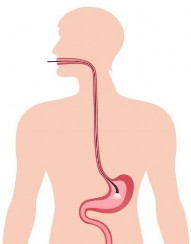
For patients having a colonoscopy or some types of surgery, it is essential that the colon (bowel) be thoroughly cleaned and emptied of all solid matter (poo). Cleansing the colon is called bowel preparation, or ‘bowel prep’.
What is the purpose of bowel preparation?
The goal of bowel preparation is to empty and clean the bowel before a colonoscopy or surgery. These procedures might be done to find or remove polyps or cancer.
Why is bowel preparation important?
Good bowel preparation allows the doctor to clearly see the whole lining of the colon. The procedure is then more likely to be accurate and complete. If the bowel is not completely clean and empty, the procedure may need to be postponed or repeated, some complications may be more likely to occur, and important findings, like polyps and cancer, could be missed.
What exactly is bowel preparation?
Your doctor will prescribe the bowel preparation that is best for you. In general, you will need to:
-
Modify your diet
Your doctor may recommend a low-residue or fibre- free diet a few days before your procedure. After this, you may be asked to follow a clear-liquid diet, including vegetable or beef broth, black tea and coffee, clear fruit juices (the ones you can see through, like apple or white grape juice) and soda water.
-
Take a laxative or bowel preparation medication
This medication causes diarrhoea and empties the colon. Adding the powdered medication to water makes a liquid that you swallow. There are different brands of medication, and which one you use will depend on what your doctor has prescribed and your other medical problems. As the medicine does its job, you will start spending a lot of time on the toilet.
-
Increase your fluid intake
Drink extra glasses of water to prevent dehydration. The medication instructions will tell you how much extra water you need to drink. Bowel preparation may be difficult for some people to finish. Talk to your doctor about any concerns you have. They may suggest tablets to stop vomiting.
Remember to take your bowel preparation medicine as instructed to make sure your procedure goes smoothly.
Are there different types of bowel preparation medications?
Yes. There are several effective bowel preparation medications (laxatives) available. Common brand names include PicoPrep®, GlycoPrep®, Fleet Phospho-Soda®, ColonLYTELY®, Picolax®, GoLYTELY®, Plenvu® and MoviPrep®. Kits including combinations of these products are also available. Your doctor may recommend one of these or another medicine.
You can buy specific medications from your doctor or at a pharmacy. Read the packet information carefully. Follow your doctor’s instructions about the exact dose and timing of your medication.
What determines the type of bowel preparation I receive?
People with certain medical conditions need different types of bowel prep medicine. Tell your doctor if you are pregnant or breastfeeding or if you have:
-
a history of bowel obstruction (bowel blockage)
-
inflammatory bowel disease (IBD)
-
had trouble with bowel preparations in the past
-
high blood pressure
-
diabetes
-
any current or previous heart, kidney or liver diseases
-
any allergies
The timing of the procedure and your preferences (taste or amount of medication) are also considered.
What are the common side effects?
Your doctor will explain the possible side effects of your bowel preparation medication. Most of the time, bowel preparation medicines are safe. Most patients have no problems with taking them.
The type and severity of side effects vary between patients and depending on the product used. The most common side effects are:
-
mild nausea or vomiting
-
stomach cramps
-
intestinal gas
-
dry mouth
-
increased thirst
Very rarely, bowel preparation medicine can cause problems for the kidneys or heart or trigger seizures.
Rarely, patients may have an allergic reaction to the medication. This might include a rash, swelling of the face or hands, swelling or tingling in the throat or mouth, difficulty breathing or tightness in the chest. If you have any of these symptoms, call a doctor or an ambulance immediately. This type of reaction is an emergency.
Can I continue to take my other medications?
Tell your doctor about all other medications and supplements you are taking, especially:
-
aspirin products
-
clopidogrel (Plavix®) or ticagrelor (Brilinta®)
-
blood thinners, like warfarin, rivaroxaban, apixaban and dabigatran
-
arthritis medications, such as anti-inflammatory drugs
-
diabetes medications
-
iron products
-
fish oil
-
the contraceptive pill
Some medicines can interfere with the bowel preparation or the procedure. Most medications can still be safely taken.
The contraceptive pill
If you are taking the combined oral contraceptive pill, discuss this with your doctor, as bowel preparation may affect the pill. As long as you take the pill in the morning (more than a few hours before starting bowel prep) and then the day after the procedure, you should not have a problem. If you are taking the minipill, you might need to consider using back-up contraception (such as condoms) until your next period.
What if I forget or remember too late to finish the bowel preparation?
Call your doctor and ask what to do if you are not able to complete the bowel preparation as advised.
What if travel requirements, age or disability makes bowel preparation difficult?
It is important to discuss this with your referring doctor or specialist. A disabled, elderly or frail person might be able to complete bowel preparation in hospital. Patients who need to travel a long way for the procedure may need access to local accommodation to undertake their bowel preparation.
If you have any questions or need advice, please talk to your doctor. This information is relevant for adult patients – recommendations are slightly different for children.
Acknowledgements
This resource was reviewed and updated by the following health professionals in 2022:
Dr Adam Haigh, Gastroenterology Advanced Trainee, Gold Coast University Hospital, Gold Coast QLD Australia
Dr Matthew Remedios, Senior Consultant Gastroenterologist, Royal Brisbane and Women’s Hospital, Brisbane QLD Australia
Requests and enquiries concerning reproduction and rights should be addressed to: Gastroenterological Society of Australia (GESA) Level 1, 517 Flinders Lane, Melbourne VIC 3000 | Phone: 1300 766 176 | email: gesa@gesa.org.au | Website: http://www.gesa.org.au
This document has been prepared by the Gastroenterological Society of Australia and every care has been taken in its development. The Gastroenterological Society of Australia and other compilers of this document do not accept any liability for any injury, loss or damage incurred by use of or reliance on the information. This work is copyright. You may download, display, print and reproduce this material in unaltered form only (retaining this notice) for your personal, non-commercial use or use within your organisation. Apart from any use as permitted under the Copyright Act 1968, all other rights are reserved. © 2022 Gastroenterological Society of Australia ABN 44 001 171 115.


